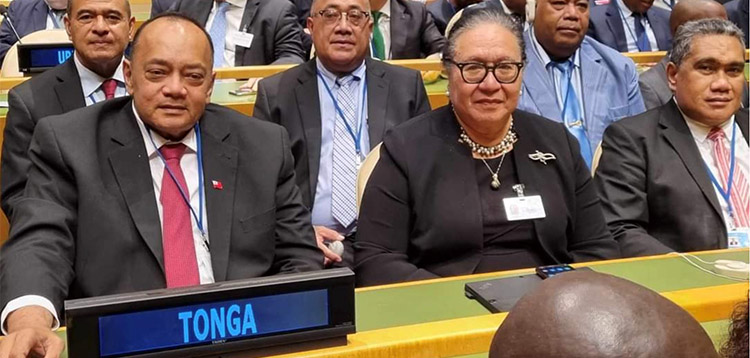
By Mary Lyn Fonua and contributors
Following Prime Minister Hu’akavameiliku’s decision to retain his Foreign Minister this week, after King Tupou VI in Privy Council withdrew his consent to her appointment, some unanswered questions have been raised about how much power the Monarchy actually possesses over the Kingdom’s foreign policy decisions.
The legal advisers to the Privy Council and those of the Cabinet of Hon. Hu'akavmeiliku's government appear to disagree over what the Constitution has to say about who calls the shots.
While there is scant meaningful public discussion over the apparent impasse between the Palace and the Government in the running of the Ministry of Foreign Affairs, a recent Corporate Plan from the Ministry of Foreign Affairs shed some light on the (previous) government's navigation strategy, when it stated that: “Our foreign policy remains to be an unwritten one.”
In that same ‘Corporate Plan & Budget 2020/2021 – 2022/2023’, the Ministry of Foreign Affairs stated that the duty of the foreign minister: “…is to administer and effectuate the formulation of strategies required to achieve foreign policy through the Royal Assent of His Majesty King Tupou VI.” It cited Clause 51 of the Tonga Constitution, although this interpretation is not explicitly pointed out under that clause. Except for foreign agreements and treaties, Tonga’s Constitution does not explicitly state whether or not royal approval is needed for foreign policy decisions.
Under clause 39 of the Tonga Constitution, international treaties and agreements require royal assent.
In 2017, the then Prime Minister ‘Akilisi Pohiva’s signing of the regional trade PacerPlus agreement was invalidated after it had been signed without royal approval – although Tonga has since ratified the agreement.
It’s unclear as to how much influence the Monarchy possesses over UN votes, such as Tonga’s recent vote against a UN resolution calling for a ceasefire in Gaza, in October.
Whether or not the Ministry of Foreign Affairs has both a Secretary appointed by the Palace and a CEO chosen by the Cabinet, also remains unclear.
Secretary of Foreign Affairs
From December 2019 onwards, the King's Lord Privy Seal, Viliami Malolo, has been recognised as Tonga's full-time Secretary of Foreign Affairs.
However, today, if you ask the Prime Minister's Office to name the Secretary of Foreign Affairs, they will tell you that the Chief Secretary and Secretary to Cabinet, Paula Ma‘u, is the Acting Secretary of Foreign Affairs.
Mr Mau said today he had held that position since “about October”, last year.
In November, the Prime Minister's Office reported that Paula P. Ma‘u travelled to the 52nd Pacific Leaders Meeting in the Cook Islands, designated as “Chief Secretary & Secretary to Cabinet and Acting CEO for Foreign Affairs.”
Yesterday, the Cabinet announced it had confidence in Hon. Fekita 'Utoikamanu and that she would continue in her role as the Minister of Foreign Affairs today, in bilateral meetings with the New Zealand Deputy Prime Minister. The PMO stated: “if you have any further questions about the Privy Council decision, contact the Palace Office and if you have any further questions regarding Government work, contact the Chief Secretary and Secretary to Cabinet.”
In response to our questions, on February 8, the Lord Privy Seal, Viliami Malolo, said: “Short answer to your question is that yes, I remain the Secretary for Foreign Affairs as appointed by His Majesty.”
--
See also:
https://matangitonga.to/2024/02/05/king-tupouVI-has-no-confidence-two-mi...
https://matangitonga.to/2024/02/06/cabinet-refutes-kings-orders-as-uncon...
https://matangitonga.to/2022/05/27/king-appoints-two-new-privy-council-m...
https://matangitonga.to/2017/08/30/tongas-signing-pacer-plus-invalid-say...




Comments
Dear Editor,
Dear Editor,
The PM and his Cabinet should remember the uniqueness of our kind of democracy. Ours is not like the British democracy where the King has no executive power. Ours is a democracy under Constitutional monarchy. The King has the ultimate executive authority over the Government. He can dissolve Parliament if it deems necessary as he has done with 'Akilisi's government back then. Our Constitution, and especially Clause 51 retains the King's authority over Cabinet by giving him authority to endorse and to revoke the appointments of Cabinet ministers. So, it will be good for the current administration not to resist the authority of the King in this matter for they may be charged with high treason.
The two portfolios the King is revoking both constitutionally belong under the King's executive power. He is the Chief of Staff of our Armed Forces and he is still according to Clause 39 of our Constitution entitled to authorise our foreign policies. What the PM could do if his Cabinet insists in retaining Fekitamoeloa 'Utoikamanu is to give her another portfolio and the PM could of course still retain his Education portfolio. They must learn to work together with the King in running the affairs of our country and not against him since the King as the Constitutional monarchy of Tonga holds the ultimate executive authority over government. And this Constitutional power of the King is meant to act as check and balances for our political system since we do not have a legal opposition party in Parliament.
The advice of our old Tongan proverb is appropriate in this situation: 'Oua e teke'i 'a Lei mei hono fu'u mei.
Faka'apa'apa atu,
Rev Dr Ma'afu Palu